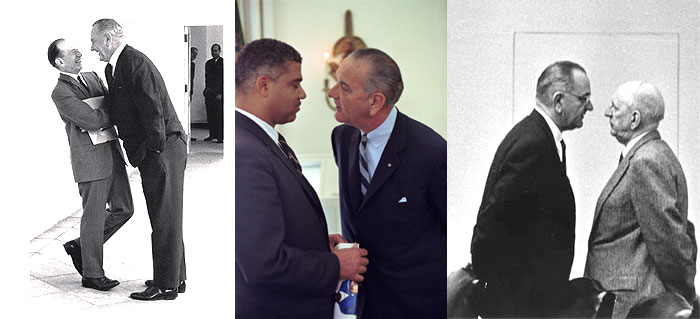Welcome to DU!
The truly grassroots left-of-center political community where regular people, not algorithms, drive the discussions and set the standards.
Join the community:
Create a free account
Support DU (and get rid of ads!):
Become a Star Member
Latest Breaking News
Editorials & Other Articles
General Discussion
The DU Lounge
All Forums
Issue Forums
Culture Forums
Alliance Forums
Region Forums
Support Forums
Help & Search
General Discussion
In reply to the discussion: Class Warfare [View all]bvar22
(39,909 posts)8. Nice Essay!
Well written,
and thought provoking.
I disagree with only one statement:
"LBJ would try to update the New Deal with his Great Society programs, but folded under the pressure from the war machine in Vietnam."
LBJ didn't "fold".
Despite the VietNam War, he was still able to get a National, Single Payer, Publicly Owned, Government Administered Health Care Program (Medicare) enacted, and most of the Great Society & War on Poverty Programs enacted too.
The Great Society was a set of domestic programs in the United States announced by President Lyndon B. Johnson at Ohio University and subsequently promoted by him and fellow Democrats in Congress in the 1960s. Two main goals of the Great Society social reforms were the elimination of poverty and racial injustice. New major spending programs that addressed education, medical care, urban problems, and transportation were launched during this period. The Great Society in scope and sweep resembled the New Deal domestic agenda of Franklin D. Roosevelt.
Some Great Society proposals were stalled initiatives from John F. Kennedy's New Frontier. Johnson's success depended on his skills of persuasion, coupled with the Democratic landslide in the 1964 election that brought in many new liberals to Congress, making the House of Representatives in 1965 the most liberal House since 1938.
Anti-war Democrats complained that spending on the Vietnam War choked off the Great Society. While some of the programs have been eliminated or had their funding reduced, many of them, including Medicare, Medicaid, the Older Americans Act and federal education funding, continue to the present. The Great Society's programs expanded under the administrations of Richard Nixon and Gerald Ford.
http://en.wikipedia.org/wiki/Great_Society
Some Great Society proposals were stalled initiatives from John F. Kennedy's New Frontier. Johnson's success depended on his skills of persuasion, coupled with the Democratic landslide in the 1964 election that brought in many new liberals to Congress, making the House of Representatives in 1965 the most liberal House since 1938.
Anti-war Democrats complained that spending on the Vietnam War choked off the Great Society. While some of the programs have been eliminated or had their funding reduced, many of them, including Medicare, Medicaid, the Older Americans Act and federal education funding, continue to the present. The Great Society's programs expanded under the administrations of Richard Nixon and Gerald Ford.
http://en.wikipedia.org/wiki/Great_Society
It is sad to realize that that crusty old WarMonger was the most Liberal President of the last 1/2 Century.

"The Johnson Treatment".
http://thejohnsonpost.blogspot.com/2009/08/johnson-treatment.html
Edit history
Please sign in to view edit histories.
Recommendations
0 members have recommended this reply (displayed in chronological order):
34 replies
 = new reply since forum marked as read
Highlight:
NoneDon't highlight anything
5 newestHighlight 5 most recent replies
RecommendedHighlight replies with 5 or more recommendations
= new reply since forum marked as read
Highlight:
NoneDon't highlight anything
5 newestHighlight 5 most recent replies
RecommendedHighlight replies with 5 or more recommendations